The Microsoft Surface Laptop 3 Showdown: AMD's Ryzen Picasso vs. Intel's Ice Lake
by Brett Howse & Andrei Frumusanu on December 13, 2019 8:30 AM ESTSystem Performance
Moving on from SPEC to some of our more traditional laptop tests, I’ve taken the opportunity to add some new tests to the suite, which we’ll include on all laptops going forward. While SPEC is a fantastic set of tests to probe the limits of a platform, not everyone is going to run a workload that runs at nearly 100% CPU utilization for such a long time on a laptop. The 8-Thread tests took 4.5 hours to complete on Ice Lake, and 6.5 hours to complete on Picasso, which is likely not something most people would turn to a thin and light laptop for, so it’s important to see how both platforms perform on shorter tests where they can leverage their peak boost frequencies for a higher percentage of the duration.
PCMark 10
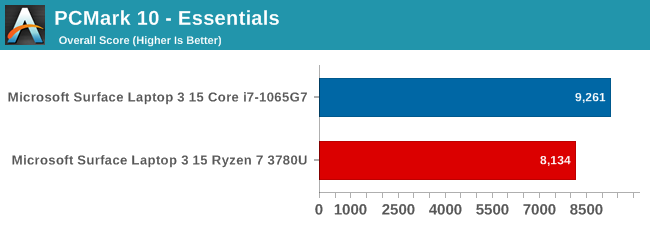
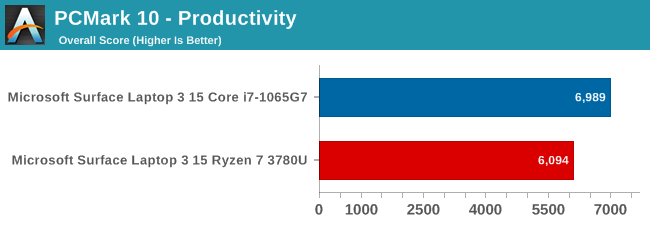
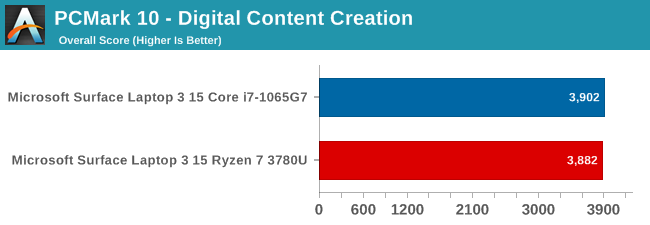
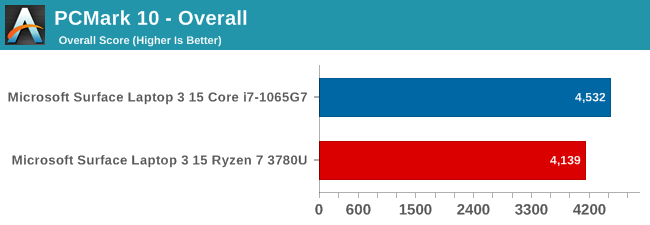
PCMark 10 consists of several real-world tests, including web, video conferencing, spreadsheets, writing, and more. There are several GPU tests as well, including rendering, and some gaming. The suite also measures application start-up, and all aspects of the system’s performance factor into the score.
Intel’s CPU performance lead shows clearly here again, with significant leads in both the Essentials and Productivity tests, although AMD’s strong GPU pulls the Ryzen system very close on the Digital Content Creation tasks. But that is not enough to turn the tide, and the Ice Lake platform carries this win.
Cinebench R20
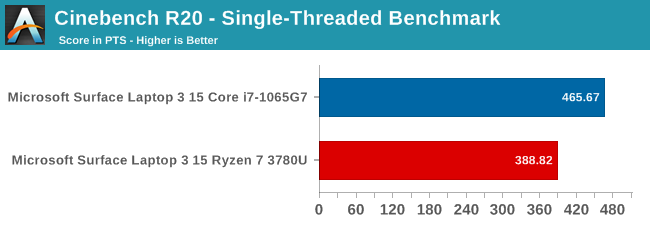
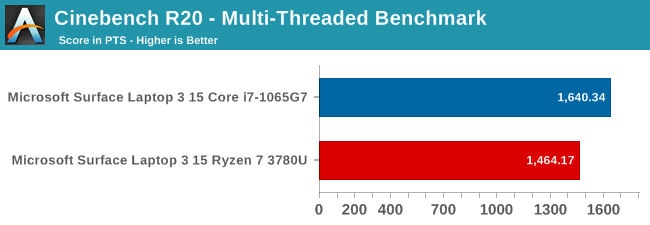
Looking at the latest version of Cinebench tells a similar story as to what we’ve seen so far. Ice Lake’s significant IPC lead pulls it way ahead. On the multi-threaded test, the AMD platform does close the gap somewhat, which is similar to the SPEC rate 8 results.
7-Zip
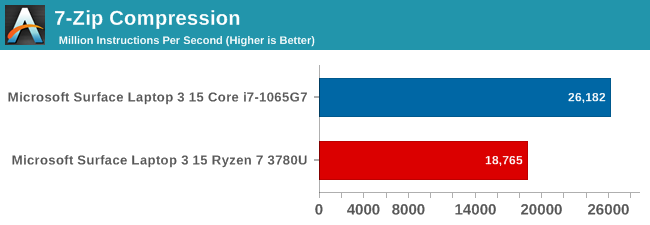
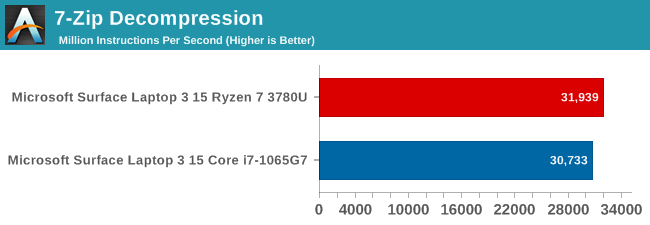
Checking out the popular 7-Zip file compression tool, the results are in-line with what we see in the desktop space. Intel generally has a lead on the compression side, but AMD claws back at decompression. It is a rare win on the CPU side for AMD here.
Handbrake
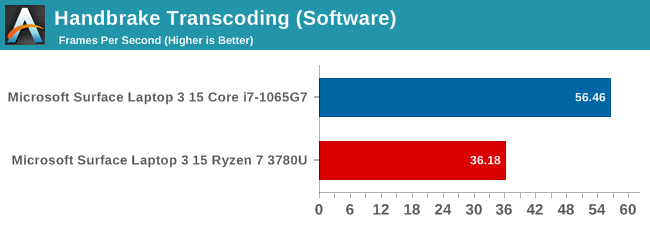
Transcoding is a popular task, and Handbrake is one of the most popular tools. For this test, a 1080p movie is converted to 720p using the x264 encoder. Once again, Ice Lake offers significantly more performance when transcoding in software.

Handbrake also supports various hardware encoders, such as Intel’s QuickSync, which provides significantly quicker transcodes at the same settings – albeit at larger file sizes and slightly lower quality compared to the software transcode, according to the Handbrake documentation. QuickSync has been very popular, and has been around quite a while. AMD also offers hardware encoding and decoding with their Video Core Next platform. Handbrake does support AMD’s Video Coding Engine (VCE) but the Surface Laptop 3 does not offer this as an option in Handbrake, so it was not able to be tested. As this is the only current Ryzen mobile APU we’ve tested, it may be a driver issue specific to the Surface branded processor.
x264
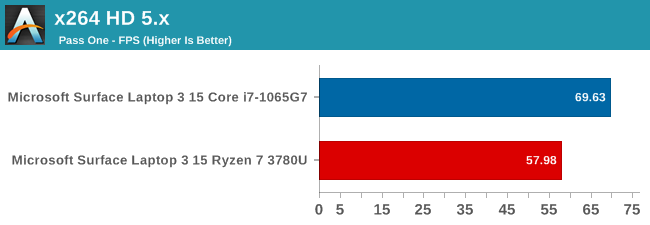
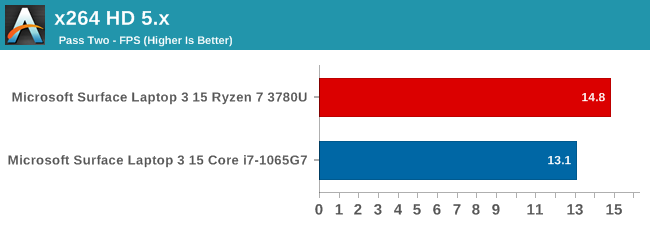
Our previous transcoding test, x264, was also run. Here we see that once again Ice Lake has a significant performance advantage, as it did with Handbrake software encoding.
Web Tests
All of our web tests were run with the current version of Microsoft Edge in Windows 10 1909. Web results are highly impacted by the underlying scripting engine, and Microsoft is going to be moving Edge from the EdgeHTML rendering engine to the Chromium open-source project that powers Google Chrome. When they make this change, expected early in 2020, we’ll revamp our suite with new tests.
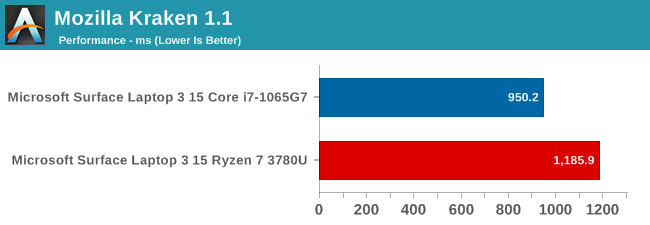
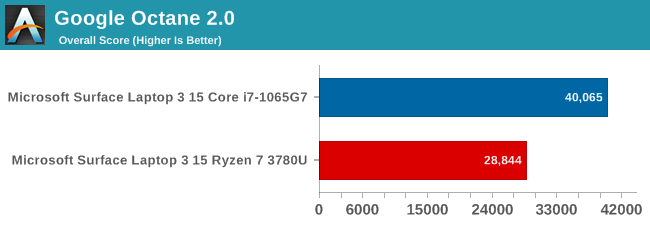
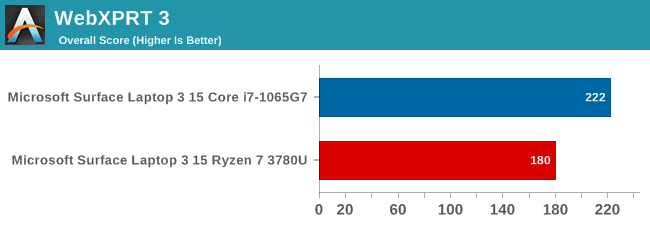
Intel has aggressively pushed their frequency ramping with Speed Shift, and one of the biggest beneficiaries of Speed Shift is web scripting, since the tasks tend to be very short. AMD is addressing this in Zen 2 with Collaborative Power Performance Control 2, or CPPC2, which is not as elegant of a name as Speed Shift, but promises to drop Zen’s frequency ramping from ~30 ms to ~1 to 2 ms, and will be a welcome addition on our web tests.










174 Comments
View All Comments
kgardas - Friday, December 13, 2019 - link
Thanks for the great article! Intel surprised me a bit since this Ice Lake wonder looks like Zen2 or even better. Now, the only question is when we can get Ice Lake cores in Xeon E/W form?UglyFrank - Friday, December 13, 2019 - link
Coffee Lake & Zen+ were very close in IPC terms & Ice Lake & Zen 2 both had similar IPC increases from their predecessorsphilehidiot - Sunday, December 15, 2019 - link
We all knew what the CPU result was going to be, and really this is a great foot in the door for AMD for when they have a competitive mobile product. Given the relentless execution after execution, I'm hopeful for something good here. I suspect they've left laptops until last as that's where a lot of Intel's dirty tactics are in play and will be the hardest market to crack. Working with MS will undoubtedly give AMD some ideas of where they can optimise for Windows on their end and also get MS to optimise on theirs. Given that AMD are actually competitive now, I suspect Microsoft are more interested in dealing with them.The surprise for me was the GPU leap from Intel. I was expecting AMD's GPU option to be far better and Intel's to just be the usual perfunctory stuff, good only for multimedia and maybe Minecraft. That.... could be a sign of things to come, methinks.
Lolimaster - Monday, December 16, 2019 - link
Vega11 is the same as the Ryzen 2400G. Zen2+ mobile will be a major upshift.philehidiot - Tuesday, December 17, 2019 - link
I really hope you're right. It's great to finally see competition. I am actually considering upgrading my main PC for the first time in years. What I don't want is Intel abusing its market position to cane AMD in the GPU market with an inferior product.YB1064 - Tuesday, December 17, 2019 - link
I did not expect such a big improvement in IPC from Intel either. Looks like they were holding back. A desktop equivalent is going to snatch the CPU crown back from AMD. I just hope the platform price is not insane.cheshirster - Wednesday, December 18, 2019 - link
Problem is that 10nm can't hit high enough clocks.They are now backporting it to 14nm, and the result will have a questionable ... everithing other than performance in games.
eva02langley - Friday, December 13, 2019 - link
Really interesting. It just proves that AMD needs to upper their game in laptops, still it is jsut telling me that I should wait for Zen 2 mobile at this point.At least, i know what I will buy in the future.
Targon - Friday, December 13, 2019 - link
7nm AMD laptop chips are expected to show up in January at CES, potentially even shipping at that point. With the 15% IPC boost, that will help a lot. If Zen3 brings another 15% IPC boost(something that has been rumored), then in January 2021 we might see AMD beating Intel in the laptop space(since Intel doesn't improve IPC all that often).RSAUser - Friday, December 13, 2019 - link
I think it will probably be higher once Zen3 ships as node will either have had a process improvement or shrunk to 5nm.Current AMD mobile is pretty bad, hope they get competitive and bring laptop prices down.